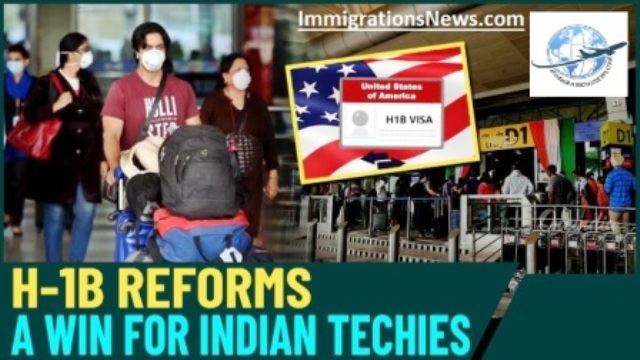The US H-1B visa 2025 program has undergone significant changes that are set to take effect on January 17, 2025. The reforms in the H-1B visa program aim to increase efficiency, fairness, and flexibility in hiring foreign talent, particularly benefiting Indian techies. In this article, we’ll explore the key changes to the H-1B visa program and how Indian tech professionals can benefit from these reforms.
What is the US H-1B Visa Program?
The H-1B visa is a nonimmigrant visa that allows US employers to temporarily hire foreign workers in specialty occupations. These occupations typically require highly specialized knowledge in fields such as technology, engineering, and medicine. The H-1B visa has long been popular among Indian tech professionals, with Indians comprising a significant majority of H-1B visa holders.
In 2023, Indian nationals accounted for 72.3% of the total 386,000 H-1B visa holders. With 2025 reforms, the US H-1B visa program is set to be more accessible and beneficial for Indian professionals, offering greater flexibility and an easier path to securing long-term employment in the United States.
Key Updates to the US H-1B Visa Program for 2025
The US Citizenship and Immigration Services (USCIS) has introduced several key updates to the H-1B visa 2025 program aimed at improving efficiency and fairness. Let’s take a closer look at the major revisions that will impact the application process for Indian techies:
1. Revisions to the Definition of ‘Specialty Occupation’
One of the most significant changes involves the definition of “specialty occupation”. Previously, the degree requirement for the H-1B visa was that it must be “directly related” to the job. The new revisions clarify that the degree must show a “logical connection” to the duties of the position, rather than a direct correlation. This change allows for a broader interpretation, meaning Indian tech professionals with degrees in related fields may now qualify for the H-1B visa even if their degree is not an exact match to the job description.
2. Smoother F-1 to H-1B Transition
For international students in the US on an F-1 visa who wish to transition to an H-1B visa, the new rules offer a smoother path. Under the updated program, F-1 visa holders will see their visa status automatically extended while their H-1B application is under review. This will ensure that their work authorization remains intact until the application is processed, avoiding any gaps in legal employment or status.
3. Changes in Cap-Exemption Rules
The cap-exemption rules have also been updated. Nonprofit organizations and government research institutions that focus on research activities will now qualify for H-1B visa exemptions, even if research is not their primary focus. This change will allow more organizations to hire foreign talent, providing Indian techies with additional job opportunities in research and development fields. Furthermore, employees working at these institutions who support their missions will also benefit from the cap-exemption.
4. Strengthened H-1B Program Integrity
To enhance the integrity of the H-1B visa program, USCIS has implemented stricter requirements for employers petitioning for the visa. Employers must now prove that the job offered is a legitimate specialty occupation. USCIS can request additional documentation to verify the authenticity of the position. The employer petitioning for an H-1B visa must also ensure that the petition aligns with the Labor Condition Application (LCA) and confirm that the employer maintains a legal presence in the US.
5. Greater Benefits for Petitioners and Beneficiaries
The H-1B visa program reforms focus on providing greater benefits for both petitioners (employers) and beneficiaries (foreign workers). The updated rules streamline the application process, reduce delays, and increase the flexibility for employers to retain their skilled employees. These improvements are designed to make it easier for both foreign tech professionals and employers to navigate the visa process with fewer obstacles.
How Do These Changes Benefit Indian Techies?
The H-1B visa reforms for 2025 bring numerous advantages for Indian techies looking to secure employment in the United States. Here’s how these changes directly benefit them:
| Reform | Benefit to Indian Techies |
|---|---|
| Definition of Specialty Occupation | Easier qualification for tech jobs based on logical connections to the degree, not an exact match. |
| Smoother F-1 to H-1B Transition | F-1 visa holders can continue working without disruption while awaiting H-1B approval. |
| Cap-Exemption for Research Institutions | More job opportunities in nonprofit and government research organizations with visa exemptions. |
| Stronger Program Integrity | Increased assurance of securing legitimate, specialized tech positions under H-1B visas. |
| Faster and Flexible Application Process | Streamlined application process, fewer delays in securing the visa and work authorization. |
These revisions aim to make the H-1B visa program more accessible to Indian tech professionals, reduce wait times, and simplify the entire process for both employers and employees.
How to Prepare for the New H-1B Visa Rules
As an Indian techie looking to benefit from these changes, here are some practical steps you can take:
- Review Your Qualifications: Ensure your degree is aligned with the updated requirements for a “specialty occupation.”
- Stay Updated on Visa Process Changes: Keep an eye on any further updates or clarifications issued by USCIS.
- Consult Your Employer: If you’re employed by a US-based company, discuss the new H-1B visa rules with HR to ensure they’re aware of the revisions and can help navigate the process.
- Prepare for Smooth F-1 to H-1B Transition: If you’re an F-1 visa holder, ensure you understand the automatic extension of your status during the H-1B application process.
How the US H-1B Visa Program Changes Will Affect Indian Techies in 2025
The H-1B visa reforms for 2025 are a major step toward improving the visa process for both employers and foreign workers, particularly Indian techies. With these changes, Indian professionals in the tech industry will find it easier to qualify, transition to the H-1B visa, and secure long-term employment opportunities in the United States.
These reforms will not only streamline the H-1B visa application process but also increase job opportunities and strengthen the integrity of the visa system. As a result, Indian tech professionals can look forward to a more efficient, fair, and flexible path to building their careers in the US.



